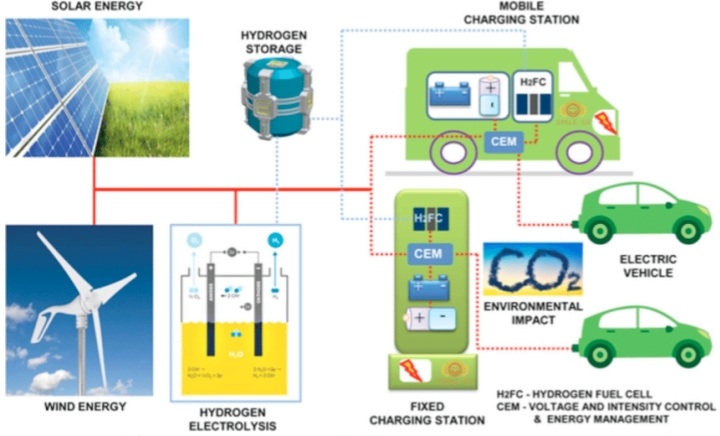The Shift to Renewable Energy powered Vehicles to Reduce Environmental Hazards

By Yemi Olakitan
Technology is the key to assisting manufacturers as the automotive industry rushes to create a new world of mobility and sustainability that is friendly to the environment as the world moves towards a cleaner atmosphere.
The pandemic’s effects on the supply chain and shipping are still being felt by the industry, in addition to continuous shortages of parts and semiconductors.
Despite these ongoing upheavals, industry forces from inside and beyond are driving the sector towards the future normal with improved mobility and more environmentally friendly practices.
The car sector hasn’t always given much attention to sustainable and environmental practices. However, the world is calling for a change.
Traditional assembly-line manufacturing methods, many of which are still in use today, consume a significant amount of energy, metals, polymers, pollutants, and human labour, leaving a significant carbon footprint in their wake.
Additionally, the majority of vehicles need fossil fuels to run after they are built, which results in the discharge of harmful emissions.
The entire procedure has had a significant negative influence on the ecosystem, which has led to where a tremendous climate change crisis on a global scale.
A recent study by SAP and Oxford Economics found that manufacturers are now setting the pace for a clean environment and sustainable change as attitudes towards the environment are changing.
The findings demonstrate that manufacturing CEOs really outperform executives from other industries in terms of taking initiatives to improve environment friendly vehicles and its sustainability.
Some business leaders in the automobile industry are already concentrating on reorganizing operations to achieve environmental objectives.
Auto companies such as Volkswagen, which is constructing a whole new facility to produce electric automobiles is a classic example.
Environmentalists are certain that manufacturers need to reconsider every step of the manufacturing process, from the design and engineering phases through the manufacturing and shipping operations to the operational, maintenance, and disposal processes for their automobiles in order to achieve a cleaner environment.
Reports suggest that the automotive sector must urgently transition to a low-carbon model. The industry itself is on the verge of a tipping point due to increasing emissions.
Eco mode usage
Many manufacturers provide eco mode, a fuel-saving function that tells the engine computer to go into a programme that prioritises efficiency over performance.
Typically, an inside switch is used to activate this mode. The specifics of Eco modes vary by model, but generally speaking, they aim to get a few more miles per gallon of petrol by limiting throttle response, accelerating higher gear shifts, and using other fuel-saving techniques.
Depending on their viewpoints and presumptions, the experts have varying judgements and predictions about gas-powered vehicles.
According to some experts, the greatest sector of oil consumption may cease to exist by 2030 as electric cars (EVs) take the lead in global auto sales.
They assert that Electric Vehickes are less expensive to own overall than gas-powered vehicles, and that government regulations and advances in battery technology will increase Electric Vehicles consumer appeal and affordability.
According to other industry analysts, gas-powered vehicles would still account for a sizeable market share by 2030, ranging from 50% to 75%3. They contend that benefits of petrol cars include a greater range, quicker refuelling, and improved performance in cold climates.
They also note that there are still issues with EVs, such as high upfront costs, a lack of adequate charging stations, and environmental effects from battery production and disposal.
According to some analysts, California’s plan to phase out gas-powered automobiles by 2035 will necessitate large grid infrastructure investments to meet the resulting rise in energy demand.
They issue a warning that the current system cannot handle the shift and that more renewable energy sources are required in order to reduce greenhouse gas emissions from the production of electricity.
Accordingly to Electric Vehicle Initiative, a global forum for clean energy on earth, regardless of the source of electricity, electric vehicles are unquestionably better for the environment than gas-powered automobiles.”
They cite research showing that over the course of their lifespan, EVs generate less carbon dioxide per mile driven than gas-powered vehicles, even after taking emissions from the production of batteries and electricity into consideration.
EVs can also enhance public health by lowering air pollution.
It is anticipated that brand-new indigenous auto manufacturing companies will emerge in order to satisfy consumer demands.
In Nigeria, specific companies are making the shift already. One of them is Roxettes Eco-Drives Ltd. It was granted a licence to start full manufacturing and assembly of electric, LPG, CNG and hybrid vehicles in Nigeria under the administration of former President Mohammadu Buhari.
Industry observers claim that as a result of this development, the nation now appears committed to following global trends and prepared to assume its legitimate leadership role in Africa.
Recall that the Federal Government announced in late January 2021 that it had set a goal of 2025 as the year to ensure that 30% of locally produced and assembled automobiles in Nigeria are electric powered.
It has provided many incentives for Nigerians to adopt these items, including subsidies and the availability of solar-powered charging stations along highways.
With Nigeria being a member to the Paris Club Agreement on Climate Change, the action is considered as a response to the worldwide push for the production of eco-friendly vehicles.
The chief executive officer (CEO) of Mone Solar, Were Okah said that it is imperative for Nigeria to deepen renewable energy penetration as a remedy to Nigeria’s power challenges.
